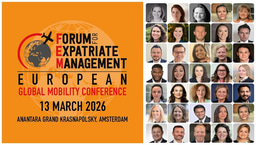Global Mobility - Attracting talent to work in Ireland and overseas

Last Thursday evening was a bitterly cold one but the warm welcome I received as I attended my first meeting of the Dublin Chapter of the Forum for Expatriation Management made up for the weather outside. I was particularly keen to attend as the topics being discussed, global mobility and the challenges in attracting talent to a country are areas I am researching within my PhD studies. It was also a unique opportunity for me to engage with tax and global mobility professionals and academic peers. Our hosts were Immedis, the format was informal and The Dublin Chapter leader Michael Rooney, Head of Global Mobility Services at KPMG ensured that the proceedings kept to schedule.
Our panel of Donal O’Connor, Group Head of Reward at Ornua, Kasia Garvin, Global Mobility Manager at Kerry Group, Alan Jordan, Business Development Manager at Santa Fe Relocation services and Trayc Keevans, Director Foreign Direct Investment at Morgan McKinley combined a wealth of experience and expertise which ensured that the evenings discussion was interesting and informative.
Our discussion was held in the context of the Brexit vote in the UK. As a result, recent Budget announcements on SARP, FED and housing initiatives were discussed and evaluated. Other topics reviewed included currency issues, healthcare access, immigration, recruitment and competition from overseas locations.
Various issues were highlighted for attention. In particular, the availability and increasingly the cost and quality of accommodation/housing on offer was discussed. Taxation, as always received much attention as did the advantages and disadvantages of different approaches to personal taxation. What was clear following the discussion was the uncertainty over the implications for mobility that a ‘hard ‘Brexit would have. Many of the panel and attendees believed that much more could be done with personal taxation and initiatives such as SARP and Fed to encourage talent to Ireland. The consensus was that, at a minimum, greater awareness of the schemes and input from a wider audience would enhance their usefulness.
A significant deficit in our offering is in the area of education for children of international assignees and the need for an augmentation of the International School system in this country. Encouragingly work has been ongoing in this area for some time and the forum is hopeful of further developments shortly. Insights from recent research highlighted attrition rates of returning assignees, the importance of perceived employer support while on assignment and the growing prevalence of a ‘portfolio approach’ to assignments with a need for the development of appropriate policies to go with these different types of assignments.
For me there were some critical take home messages; the need for detailed planning at all stages of the mobility process, the importance of assessing appropriately the needs of the assignee, their spouse and family and finally, the necessity to manage the expectations of assignees.
Note: Niamh O’Sullivan is a lecturer in the School of Business in Maynooth University. She is a PhD student with the Business School in Dublin City University. Her supervisor is Professor David Collings and her research is in the area of global mobility and talent attraction and retention at a macro level.





Please sign in or register for FREE
Sign in OR sign up to become a registered The Forum for Expatriate Management website user
Subscribe here